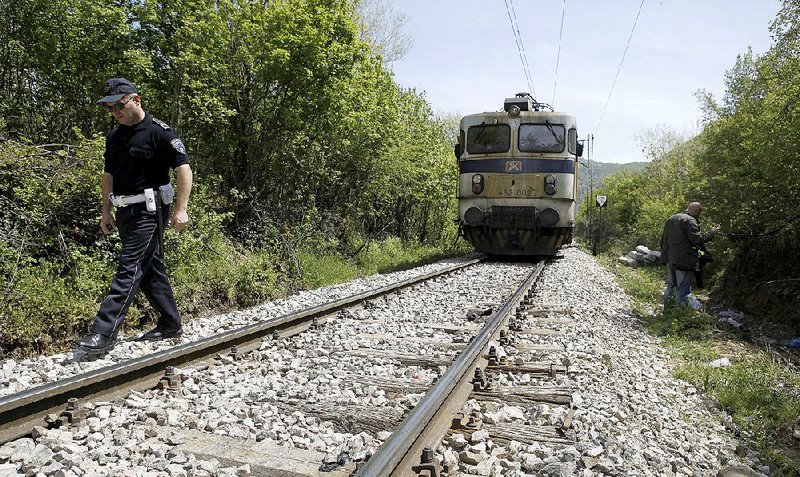VELES, Macedonia -- Fourteen people believed to be from Afghanistan and Somalia, walking in the dark along train tracks toward the European Union, were killed by a nighttime express train in a remote river gorge in Macedonia, police said Friday.
The people, part of a larger group, had been walking north of the central Macedonian city of Veles about 10:30 p.m. Thursday night when a passenger train traveling from the northern Greek city of Thessaloniki to the Serbian capital of Belgrade struck them.
"The train driver tried to stop, but it was too late and the train hit the group of migrants who weren't able to leave the tracks," said Nikola Kostov, general manager of Macedonian Railways.
Kostov said the train driver saw about 100 people on the tracks, and spotted them with only 100 yards and a few seconds before impact. He said the stretch of railway, bounded on one side by the River Vardar and the other by a steep slope, is "dangerous and unapproachable."
Refugees and migrants using an overland route from Greece through the Balkans to Hungary often use the train tracks as a path to guide them. They most commonly walk in darkness -- though the dangers of being hit by a train are greater at night -- to avoid detection by police.
An influx of people fleeing conflicts or poverty in the Middle East and Africa recently has set out for Europe, many on smugglers' boats from Libya to Italy. Although the Balkans route is safer than crossing the Mediterranean, it is still fraught with danger.
Kostov said Macedonian trains struck and killed 40 people last year, when the Balkans route experienced a sudden surge of people fleeing conflicts in Syria, Afghanistan and the Horn of Africa.
Police detained eight survivors at the scene of Thursday's accident. Police spokesman Ivo Kotevski said they would be questioned by prosecutors in Veles. Other survivors are presumed to have fled.
The Veles prosecutor handling the case, Slavica Temelkovski, said those killed were all aged 20 to 30. All were expected to be buried in a Muslim graveyard in Veles, she said.
Thousands of people attempt to reach the more prosperous central and western European countries each year by heading from Turkey to nearby Greek islands, then either trying to sneak onto Italy-bound ferries or heading overland through Macedonia or Albania. Thousands of others attempt the perilous sea crossing from Libya to Italy.
The European Union on Friday said it had doubled emergency aid to $54 million per year for Italy, Greece and Malta as they deal with the influx of foreigners.
EU Commission spokesman Natasha Bertaud said "the entire emergency fund is doubling" after an agreement at Thursday's EU summit where leaders also pledged ships, aircraft and equipment to save lives in the Mediterranean after the estimated deaths at sea of more than 1,300 people traveling from Libya to Italy over the past three weeks.
The funds can be used for reception centers for the foreigners, medical aid or additional staff members to deal with the influx. It is part of an overall EU fund for migration and asylum issues.
At Thursday's summit, the leaders also agreed to triple funding to $9.7 million per month for the EU's border operation patrolling the Mediterranean.
At the same time, Bertaud said the EU border agency Frontex is to send its ships farther into the Mediterranean Sea in response to the exodus from Libya.
Critics say Frontex's Triton mission is ineffective in dealing with the influx because its mandate restricts its border control tasks to 30 nautical miles from land and does not allow it to approach the Libyan coast.
Bertaud said a new operational plan for Triton will be agreed with Italian authorities and that this "will be ready in the coming days."
Also Friday, a judge in Sicily confirmed arrest warrants against the suspected captain and crew member of a smuggling boat that capsized last week, killing as many as 800 people.
Mohammad Ali Malek, 27, of Tunisia and suspected crew mate Mahmud Bikhit, 25, of Syria appeared in a Catania court and were ordered returned to jail. Prosecutors have accused Malek of inadvertently ramming the overloaded fishing boat into the cargo ship that had come to its rescue, destabilizing the boat, which then flipped and capsized.
Elsewhere, the United Nations' human-rights chief accused the United Kingdom's tabloid newspapers of hate speech against foreigners.
Zeid Raad al-Hussein, the U.N. high commissioner for human rights, said an article in The Sun comparing the people to cockroaches used language similar to that employed by the Nazis and instigators of Rwanda's 1994 genocide.
Zeid urged British media, authorities and regulators to curb incitement to hatred.
"The Nazi media described people their masters wanted to eliminate as rats and cockroaches," he said. "This type of language is clearly inflammatory and unacceptable, especially in a national newspaper."
He said the "nasty underbelly of racism" in Europe's immigration debate was warping the EU response to the crisis in the Mediterranean.
The Sun declined to comment. In a column for the newspaper Friday, Hopkins said the response to her remarks had reminded her to be "aware of the dangers which lurk in the depths of our vocabulary."
Information for this article was contributed by Elena Becatoros, Dalton Bennett, Lorne Cook, Raf Casert, Cara Anna and staff members of The Associated Press.
A Section on 04/25/2015
